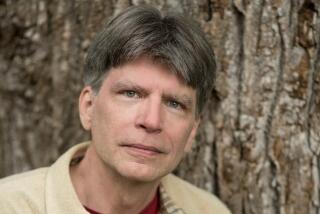BOOK REVIEW : Taking a High-Energy Trip Through a High-Tech World : ALOHA <i> by Mark Christensen</i> ; Simon & Schuster, $21, 287 pages
In a perverse way, Mark Christensen’s dark, funny and hyper-technological new novel reminds us of “Witness,” the movie in which Harrison Ford plays a big-city cop forced to hide out among Pennsylvania Amish whose technology hasn’t changed in 200 years.
The Amish put the brakes on progress in the interests of “plainness” and holiness, but, by accident or design, they also did it at the last moment in Western history when a person could carry his whole culture around in his head. Remember the scene in which the little boy explains to Ford how his farm’s water system works? If everything there were obliterated--by an H-bomb, say--he could rebuild it from scratch.
Not the rest of us. Not anymore. As human beings’ collective knowledge expands, the fraction of it that any individual can grasp becomes smaller and smaller. This breeds a sense of incompetence; hence, anxiety. It can seem, to give the Amish their due, downright unholy.
Christensen, a Long Beach resident whose previous works include a novel, “Mortal Belladaywic,” and a nonfiction book on television, “The Sweeps,” is the latest writer to exploit our ambivalence about technology, our mixture of exhilaration and dread. He approaches it as most other current novelists do, both sci-fi and mainstream. His stock in trade isn’t knowledge--for who can claim much of that these days? Nor is it wisdom--for that implies truths more durable than technological change seems to allow. It’s expertise.
What distinguishes “Aloha,” besides its quirky narrative voice and slam-bang pacing, is the detail with which Christensen describes the early 21st Century, the gusto with which he invents grotesqueries that are plausible extensions of late 20th-Century trends. Violence has slipped its Cold War moorings. The only ideology left is business. Korea is a corporation, not a country. Casual lovers give each other HIV skin tests. The ozone layer has eroded so badly that nobody goes to the beach without 175-SPF sunscreen.
In short, Christensen wows us with his expertise just as Frank Crawford, billionaire scion of a construction empire, is wowing the narrator, his younger brother Tod. Tod is bright but mentally ill and woozy on medication; he can describe the mechanics of Frank’s grandiose schemes--just like the little Amish boy--while remaining as befuddled as we are about what the big guy is up to.
Frank certainly has his sinister side. As a senior Air Force officer, he worked out the details of a nuclear first strike on the Soviet Union--”a plan,” Tod says, “just too hip for the room” at the Strategic Air Command. His new plan, to tap an undersea volcano and create a new Hawaiian island, is overkill in its entrepreneurial form:
“A square mile of magma, money and fax machines, it will ooze from the ocean 13 miles off the Big Island of Hawaii and, as home of 700-plus . . . banks and booking centers--and as an only-a-few-holds-barred resort--be a penultimate tax and regulatory haven. And, given its location right outside territorial waters, it won’t belong to the United States but to us . . . worth $50 billion easy.”
Tod distrusts Frank but is used to depending on him. Besides, Frank has expertise in so many fields that it looks a lot like wisdom. Tod (although his teen-age girlfriend, Roberta, tries to remind him) forgets that expertise can go deep only because it’s so narrow, like the hole Frank’s crews are drilling under the ocean. Neither brother is able to remember for very long that the how of technology can be divorced from any defensible why.
So Tod lets Frank send him to the former U.S.S.R., now a vast swap meet for rusty military hardware. Tod thinks he’s buying film that telescopes can use to photograph the ends of the universe, but what he’s really meant to smuggle back is an end-of-the- world item--a surplus H-bomb.
“Aloha” opens excitingly, with a chase. The bomb is stolen, perhaps by a thuggish business partner. Frank blames Tod, who feels he must run for his life. And it ends excitingly, with another chase, as Frank, in a last-ditch effort to unplug the volcano, aims to use the bomb as his corkscrew.
The middle sags a little. Tod struggles to manage a Waikiki nightclub. He fitfully tries to escape his brother’s domination, to find love, to evaluate the dangers he faces--although one drawback of a semi-schizoid narrator is that nothing he says is reliable. Christensen entertains us with raunchiness, cynicism and social commentary, but he’s mostly just piling on the expertise here--and his expertise, like Frank’s, is often a substitute for something better that we miss. Something plain.
More to Read
Sign up for our Book Club newsletter
Get the latest news, events and more from the Los Angeles Times Book Club, and help us get L.A. reading and talking.
You may occasionally receive promotional content from the Los Angeles Times.






